All photos provided by and with consent of the participants, either via Facebook, Twitter, or email.
I was traveling for my sister’s wedding when the American Health Care Act passed the House. My family had half-avoided politics for a few days to keep our focus on the happier occasion at hand — though I still knew enough to suspect that 217-to-213 result was coming. So when it finally became real, I didn’t crumble like I did on election night; I absorbed the headline with the steely resolve of someone who already knows they’re getting bad news. It landed with a dull thud rather than a gut punch. But the internal calculations began, all the same.
Here’s the raw data on me:
I am a 28-year-old white, cisgender, college-educated gay woman with cerebral palsy. I’ve had three major surgeries in my life, with an emergency spinal fusion at age 18 being the most recent. I have been in and out of physical therapy since childhood, and the results make a pretty strong case for “early intervention.” I wear ankle-foot orthoses on both feet. I exercise somewhat frequently and drink in moderation. I don’t smoke or use drugs recreationally. I am not currently taking any prescription medication. I have never been pregnant. I am not married. I am extremely nearsighted and have three cavities in my teeth. I see a therapist once a week.
I am a lifelong Californian. I receive health insurance coverage through my main employer; prior to that, I was enrolled in my state’s Affordable Care Act exchange, which picked me up at 26. I received income-based subsidies during my first year of enrollment, but not in any subsequent years. I pay for dental and vision coverage out of pocket. I hold multiple freelance jobs in addition to my day job. I live in a major urban area with 18 Congressional districts. I have voted in every election in which I’ve been eligible.
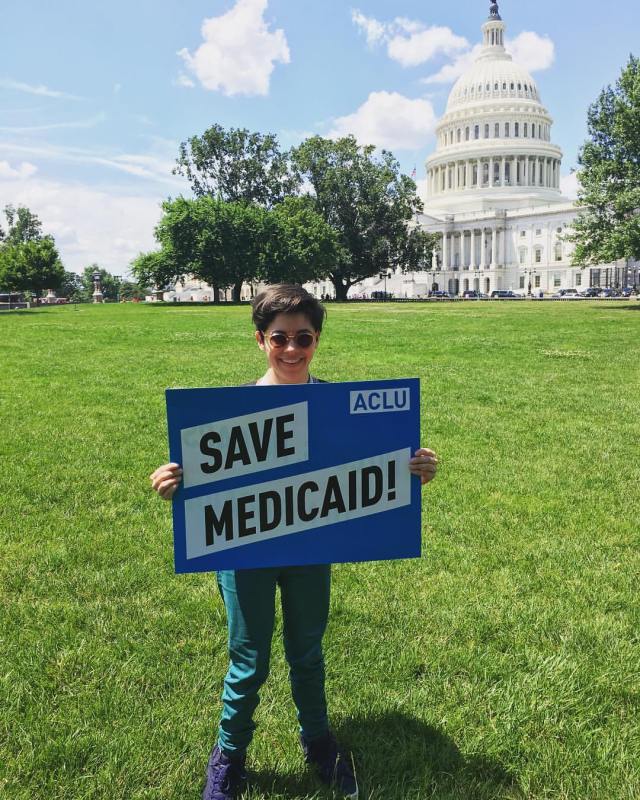
Went to a rally at the Capitol last week, it’s fine
What happens when you run all that through the equation of the House bill? On the surface, crisis averted — I can’t be denied coverage outright because of cerebral palsy. But I could end up paying a lot more for it. See what they did there? As long as the AHCA makes sure some coverage is technically available, its backers can insist I “won’t lose my insurance due to a preexisting condition.” Whether or not I can actually afford that coverage isn’t their concern. Plus, the AHCA does away with the employer mandate, meaning that my job won’t have to provide health insurance anymore — and putting me at the collective mercy of our HR and Finance departments and the state of California. I’m fine now, but it’s like a Jenga tower; move one block, and who knows what will stay standing. That’s life for someone in pretty damn good circumstances under Trumpcare.
There’s a lot of confusion around where the AHCA stands — one day it’s on the brink of collapse, the next it’s imminent. That’s the speed of current politics, thanks in part to a Republican Congress eager to ram earth-shaking legislation through at any cost. So even if you haven’t been keeping up with every twist and turn of this fight, you need to remember just who the 23 million people who would lose their health insurance under the new plan really are. If the Senate won’t hold a hearing, we’ll bring their constituents to them.
Thirty-six more queer disabled folks are here to tell you about the impact of the AHCA, and what’d they say to any Senator (somehow) still weighing their vote.
Erika / 23 / San Francisco, CA / Digital Media & Communications Associate and Super Lesbian
I am still under my parents’ plan until I turn 26, but once I reach that point I have no idea what I’ll do. It’s almost laughable, if it weren’t so serious. I would hope that our Senators can vote for something their constituents want, instead of what those who funded them into office want.
Go get ‘em, Senate! Hasn’t passed yet! You can do this!
Niamh / 28 / Seattle, WA / Queer, disabled, nonbinary trans girl

I have severe hemophilia A and a slew of mental health meds that I need to take on a regular basis. I’m prone to severe swelling in my joints that causes long-term joint damage (I have arthritis in both ankles from it). Already, I have to worry about the positions I cuddle in or have sex in because I might end up with an elbow bleed the next day.
People are usually shocked to find out how much it costs to keep someone with severe hemophilia healthy. If I were to pay for just my hemophilia medication out-of-pocket, and I was “healthy,” it would cost about $360,000/year. With lifetime caps, that means I would max out on most private insurance policies within three years. As a result, I have been on state insurance basically my whole life. That way my medication is fully covered and I’ll have consistent coverage. But that limits how much I can actually do with my life. I couldn’t attend college out of state, couldn’t study abroad or travel for long periods of time, and the prospect of moving or getting a job out of state is so incredibly stressful (even with the Affordable Care Act) that it’s something I’ve never really tried to pursue. I then also have to jump through the bureaucratic hoops of maintaining my coverage.
“With lifetime caps, I would max out on most private insurance policies within three years.”
The current healthcare system gives me some looseness in being able to find private insurance that will cover my hemophilia medication. With the American Health Care Act, it’s like moving back a decade. I’m back to making sure I don’t work a high enough paying job so I can maintain health insurance. I’m too disabled to work, but I’m not legally disabled enough to not work. The AHCA would only exacerbate that.
Sandy / 29 / Boston, MA / Educator, community organizer, disability activist
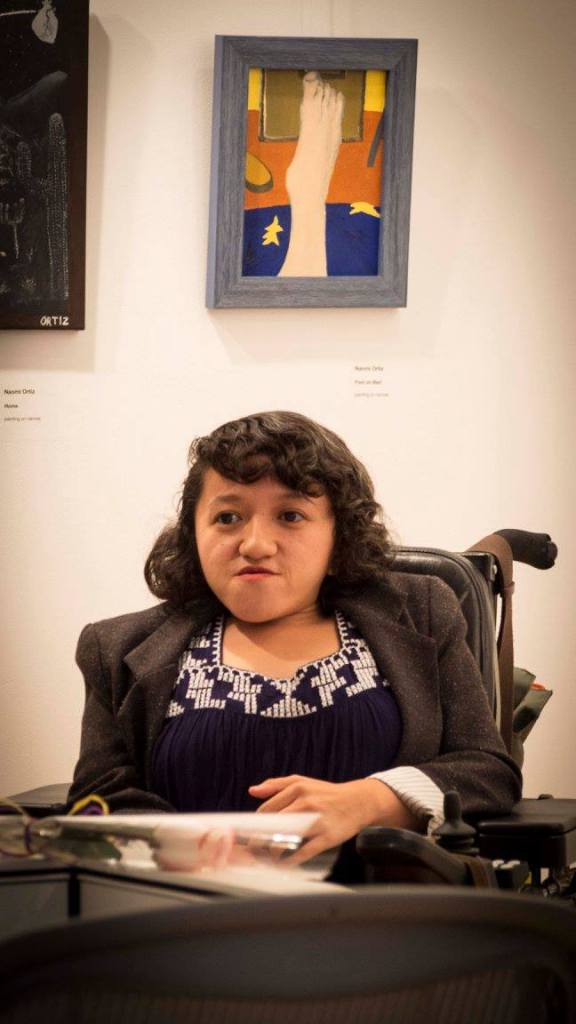
I’d first like to note that no matter which party holds political power in D.C., or how high my salary and education levels might be, and how “stabilized” my disability might be at any given time in my life, I know that I will never be able to afford to live as a disabled person out-of-pocket. Under the AHCA I would not have access to Personal Care Attendant services, my ability to afford specialist care would be non-existent, and seeing a therapist for my mental health would not be an option. Other medical care such as affording medications, surgeries, hearing tests, bone density scans, and a functioning wheelchair would be challenging to afford, if not impossible. I could already foresee myself making future decisions on whether or not to forego one medical treatment over the other as I’d try to calculate “when would I hit that lifetime cap?”
The concept of health insurance is not that we buy into it because we know when we will need it and why. Just as no one can predict when they will become disabled (because the question isn’t if, since everyone will), the idea that if only we would all “take better care of ourselves, and live better lives” is beyond repugnant. Living under this insurance would mean my disability would dictate my lifestyle, as opposed to now, when the will of my personhood has autonomy and independence over the direction of my lifestyle. Yes, my education, my job, my friends, and the city in which I live have a lot to do with my current lifestyle. But I would be lying to myself if I didn’t also recognize that my health insurance has played the biggest role in shaping my livelihood to date.
To those legislators, I urge you to vote against the AHCA. I would also like you to re-evaluate who elected you to public office, and ask yourself who is missing from that public. In the event that you need reminding: people must be at the central focus of this vote. And among them, the millions of disabled Americans. Should you vote for the AHCA, I must tell you that the consequences will far outlast your political term – my generation and generations of disabled people will not forgive.
Anna / 23 / Gainsville, FL / Actor and grad student

I could not only be denied coverage, but could end up paying $5000 per year out of pocket for the prescription meds I need to stay alive. That is currently a quarter of my yearly salary, and I cannot afford it. It also makes it more difficult for me to then seek specialty care.
I would ask any senator still debating this whether they realize that good health is primarily a matter of luck. I have a genetic predisposition toward my illnesses, and I cannot control whether I have them. I would tell them not to deny us coverage because we are PEOPLE and we deserve to live.
Al / Chicago, IL / Chronically ill and progressively disabled lesbian/communications pro

I have a very high stress job, and I am financially supporting myself and partially supporting my partner. I also have hefty student loan repayments and crushing medical debt. I will eventually become financially responsible for my mother who is blind and otherwise incapable of supporting herself.
As my disability progresses, I’m looking at eventually losing my job, and therefore my insurance. It’s a terrifying idea because I have no safety net and with the number of preexisting conditions I have, I will certainly not be aided by the government.
“What could make these people in control of our government see the value in my life? What is enough?”
The thing I find so difficult about the “debate” of voting for the AHCA is that there is no good argument.
My life should not be valued based on how much I work — but I work 90 hours a week.
My life should not be valued based on how much I can do — which is becoming less and less.
I did not cause my illness — but it shouldn’t matter even if I had.
I am not an investment waiting to be returned upon — though I’m paying my dues.
What could make these people in control of our government see the value in my life? What is enough?
Clare / 18 / Parker, CO / Member of The Resistance
Unless the protection that allows people to stay on their parents’ insurance until age 26 stays, I would be at risk of having no insurance anymore and losing all my specialists, access to medications, and treatment. If I am denied healthcare because of my degenerative illnesses (either when I am 26 or if my mom must change jobs or loses her job before then), I have no Idea what I would do.
Hopefully soon I will start receiving SSI; then I will have at least a very small amount of income. I don’t know if it would be able to cover rent for a small apartment in my state, much less $4,000-6,000 of out of pocket medical costs every year (that’s with actually good insurance). I know I’ll probably never be financially independent; the burden of increased costs would lie of me and my family, and not being able to get healthcare will effectively limit my quality of life. People think they should get to add to their profits instead of allowing me some semblance of a life.
The AHCA is not a healthcare act. It is an undeserved tax break at the expense of sick, poor, and older people’s lives. I’m one of them. The AHCA is regress, not progress. Read the actual bill and have a heart.
Danielle / 33 / St. Louis, MO / Civil rights activist, writer, and public speaker
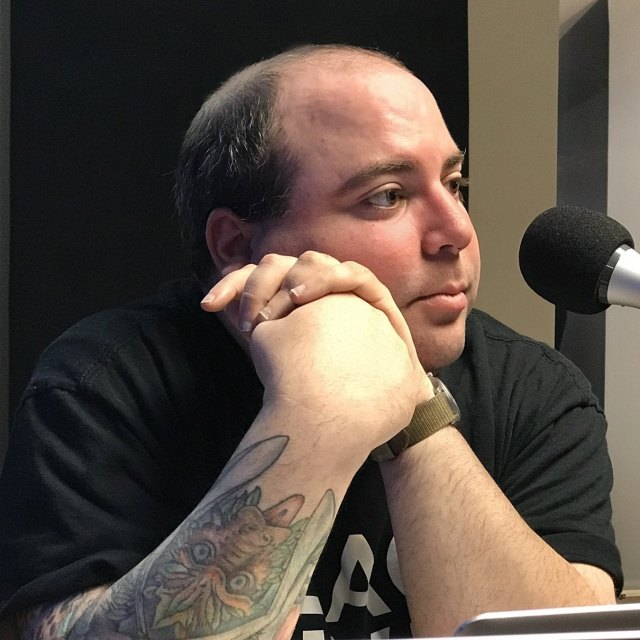
Photo by Kevin Harvell
I am struggling with housing and food right now even though I have the cheapest ACA plan available. I have a heart condition requiring surgery ASAP, I have just started transitioning, and I have chronic pain. Before I got an ACA plan, I had suicidal depression from chronic pain and gender dysphoria. It is pretty likely that I will die either from heart problems or from suicide if I lose my insurance and go back to being homeless.
“A vote for the AHCA is a vote for the death of millions of Americans. There is no debate.”
There are millions of people like me who depend on the ACA to survive or have anything even close to resembling a healthy, productive life. A vote for the AHCA is a vote for the death of millions of Americans. There is no debate.
Alexx / 22 / Long Beach, CA / Student

When my insurance through my mother’s work is no longer available to me I will be unable to afford the medications needed for managing my chronic pain, I will be unable to afford my psych meds or my EpiPen for my tree nut allergy, and I will be unable to continue therapy for my psych issues or my hormone replacement therapy.
You are going to kill me if you vote the AHCA through. You are going to kill me and others like me as surely as if you put a bullet into our brains. Your legacy will be that of a murderer. And should you abstain? Murder by negligence is no better.
Alaina / 24 / Boston, MA / Publicist, editor, storyteller, and intersectional feminist activist
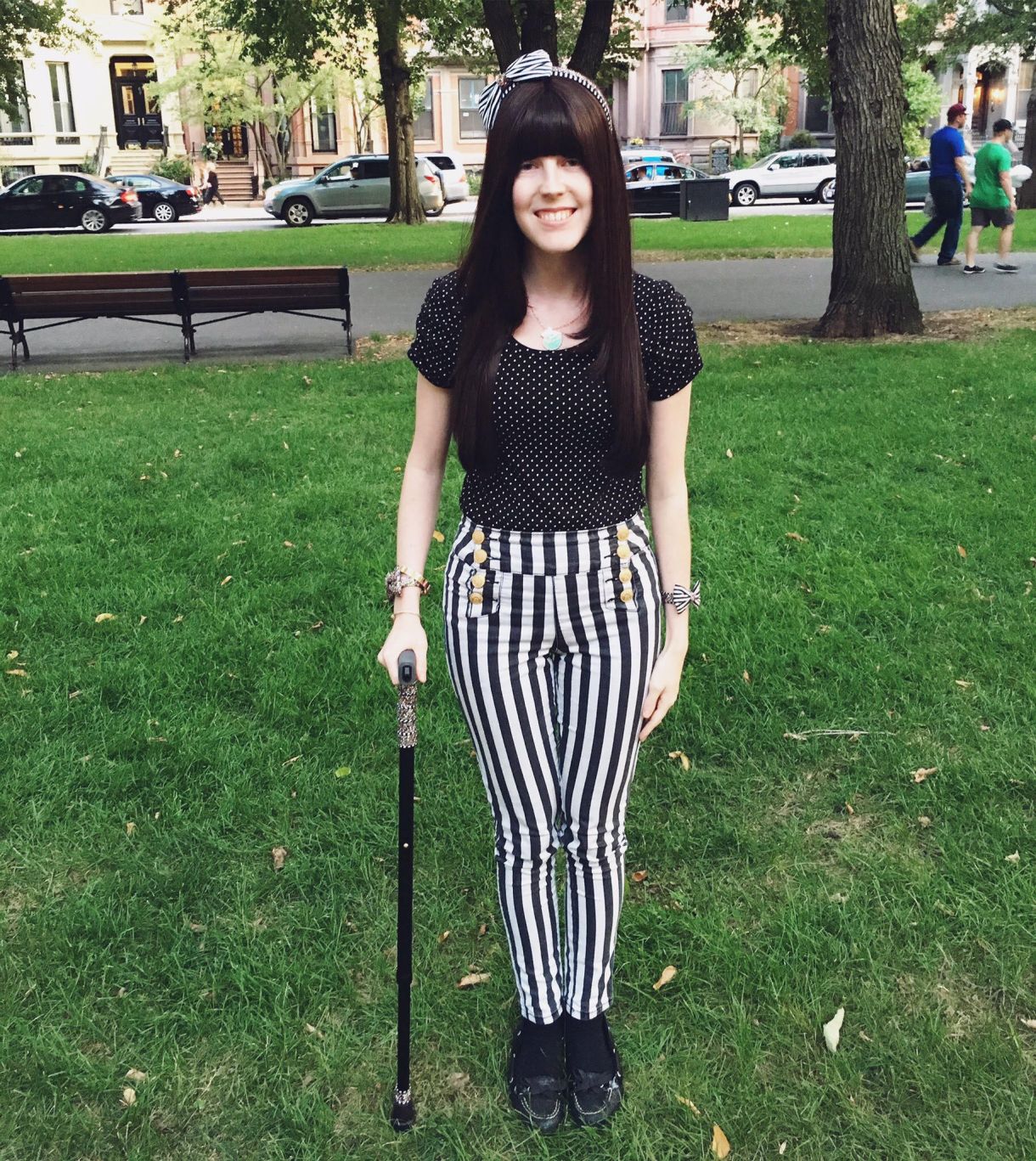
via Twitter
I’m fortunate that I live in Massachusetts, where we have state healthcare laws (that the ACA was actually based on) that currently protect me — but it’s possible that changes to the ACA or the implementation of the AHCA could remove or reduce federal funding for our state healthcare system, putting it in jeopardy. I’m also concerned about potential genetic testing requirements in the AHCA that would allow employers to essentially force employees into genetic testing. I’m afraid that if the AHCA is implemented nationally, I’ll feel trapped in Massachusetts. I do like living here, but it feels limiting to know that you literally can’t leave your state because of healthcare access, or that I’d need to have employment in another state that definitely covered both my partner and I if we were to move.
Disabled children grow up to be disabled adults, and we need continued access to healthcare throughout our lives.
Sarah / 20 / Madison, WI / Student
I have an undiagnosed health condition that causes me so much pain I have to use a wheelchair to get around, and I have pain spasms. I also have a large array of disorders including but not limited to Noonan syndrome, low muscle tone, migraines, and IBS.
My governor, Scott Walker, is in favor of high risk pools. I am currently on my dad’s health insurance but I am completely terrified of what to do when I get my own, and if/ how I will deal with being able to afford higher premiums along with large copays.
Sara / 31 / Indianapolis, IN / Student and self advocate
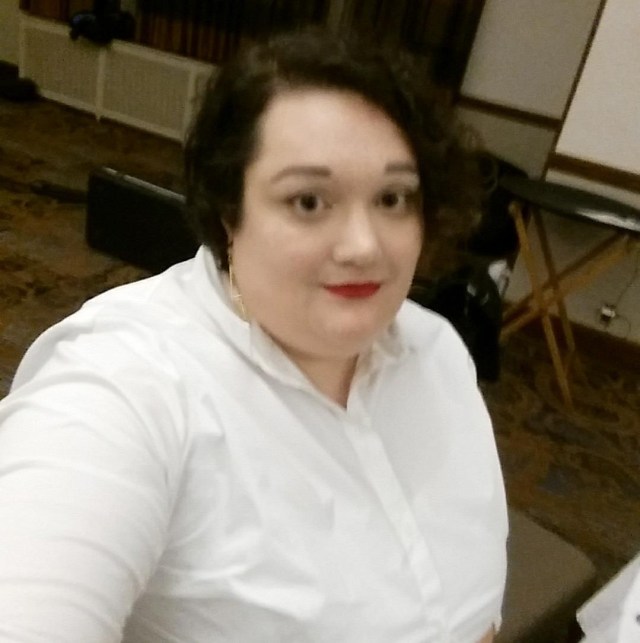
I live with a number of conditions: autism, bipolar, anxiety, asthma, an eating disorder, ADD, fibromyalgia, anemia. All of these could bar me from coverage not only from my future employers, but my spouse’s employers as well. My treatments are currently expensive with insurance. Without it, I would have no pain relief, and my mood swings, inattentiveness and suicidal ideations would return. I wouldn’t be able to finish school or manage a job, and would most likely end my own life.
I would bring out a year’s supply of medication, my mobility devices, my TENS unit, and all my current medical bills, and break every expense down to the Senate. Then they’ll have to talk, because it’ll be up to them to convince me why it’s acceptable to place my life and health at risk by voting for the AHCA.
Maggie / 35 / Rochester, NY

I am unable to work because jobs that will provide affordable health coverage and pay enough that I would be okay without SNAP and Medicaid AND would be okay with me setting my own hours and won’t mind when I’m out sick for a month or two at time because I caught a cold just don’t exist. Or perhaps they do exist but because I already live in poverty I’m just not allowed to have one.
The AHCA is a death sentence for me, someone who relies exclusively on Medicare, Medicaid, and Social Security. My only hope right now is that New York State is working on statewide single payer healthcare.
I want people to know that it isn’t nameless, faceless, person-less numbers that will be affected by this shameful legislation. It’s people you know, who keep their health information to themselves. It’s your mom, your great uncle, your second cousin you knew was having a rough time but you never imagined a car accident and subsequent hospital bills would send them hurtling towards bankruptcy. It’s people with serious medical issues that go untreated and undiagnosed because they can’t afford to see specialists even if they have some kind of “insurance” from their employer. It’s the veterans, the elderly, the disabled, and children.
“I want to live long enough to vote in the 2018 and 2020 elections.”
I would ask our Senators to explain to me in great detail why exactly access to quality health care is a right reserved only for those who have money. I would ask them how could they consider themselves a patriot of the “greatest country” in the world and literally condemn the old, the disabled, and the poor to a slow and painful death.
I want to live long enough to vote in the 2018 and 2020 elections. So far it’s looking good, but with lupus, who knows?
Pages: 1 2 3See entire article on one page

(202) 224-3121 <——- Senate switchboard number. Call today, call every day.
INDEED
I’m dying that I was mentioned in the same space as Leah.
Thank you, Carrie, for talking to so many people and putting this together. Really, thanks to everyone who spoke up here! Y’all are wonderful <3
Fuck. This struck a chord. I’m terrified.
Thank you to everyone for sharing their stories– you are all amazing. I hope we can get through this together.
Thank you all for sharing your stories.
Great article; emailing my senators now.
Here’s senator contact info by state:
https://www.dailykos.com/stories/2017/6/12/1671161/-Republican-senators-say-their-phones-aren-t-ringing-to-save-the-ACA-so-here-s-the-contact-list